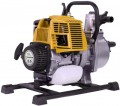Maximum performance
The maximum volume of water that the device can pump in a certain amount of time. It is one of the key specs of any pump because characterizes the volume of water with which the device can work. At the same time, it does not always make sense to pursue maximum performance — after all, it significantly affects the dimensions and weight of the unit.
Some formulas allow you to derive optimal performance values for different situations. So, if the pump is designed to supply water to water intake points, its minimum required performance should not be lower than the highest total flow rate; if desired, a margin of 20-30% can be added to this value. And for sewer models (see "Suitable for"), everything will depend on the volume of wastewater. More detailed recommendations for choosing a pump depending on performance can be found in special sources.
Maximum head
The maximum head generated by the pump. This parameter is most often indicated in meters, by the height of the water column that the unit can create — in other words, by the height to which it can supply water. You can estimate the pressure created by the pump using a simple formula: every 10 m of head corresponds to a pressure of 1 bar.
It is worth choosing a pump according to this parameter, taking into account the height to which it should supply water, as well as adjusting for losses and the need for pressure in the water supply. To do this, it is necessary to determine the difference in height between the water level and the highest point of water intake, add another 10 to 30 m to this figure (depending on the pressure that needs to be obtained in the water supply), and multiply the result by 1.1 — this will be the minimum pressure required.
Outlet size
The thread size for connecting a hose or pipe to the pump outlet. If there is a branch pipe with an external thread in the design, the size is indicated for it; if not, for the internal thread of the inlet.
Anyway, the dimensions of the pump outlet and the mounts on the hose/pipeline connected to it must match — otherwise, you will have to look for adapters. This size is specified in inches and fractions of an inch.
This parameter is relevant primarily for surface models.
Inlet hole size
The size of the thread designed to connect the pump to the suction line. This parameter is completely similar to the size of the outlet (see above) — in particular, it can be specified both for the nozzle and for the inlet of the pump.
Maximum power
Rated power of the pump motor. The more powerful the engine, the higher the performance of the unit, usually, the greater the pressure, suction height, etc. Of course, these parameters largely depend on other features (primarily the pump type, see above); but models similar in design can be compared in terms of power.
Note that high power, usually, increases the size, weight and cost of the pump, and also implies high costs of electricity or fuel (see "Power source"). Therefore, it is worth choosing a pump according to this parameter taking into account the specific situation; more detailed recommendations can be found in special sources.
Electric starter
The presence of an electric starter in the design of a pump with engine — a pump with a gasoline or diesel engine (see "Power").
An electric starter is an electric motor powered by its own battery, designed to start the engine. This method of starting is much simpler and easier than manual: the engine starts with just one push of a button, without any extra effort. On the other hand, this function significantly affects the weight, dimensions and cost of the entire unit. If the battery runs out, the electric starter becomes useless (however, in this case, a backup manual start system is usually provided). Thus, this feature is found mainly in powerful advanced units, where manual start is quite laborious.
Хар-ки двигателя
Oil tank volume
The volume of the oil tank installed in the water pump with the engine(see "Type"). This characteristic, first of all, allows you to estimate how much oil is needed for the first refuelling of the pump — the tank must be filled to the full volume.
Fuel tank volume
The volume of the fuel tank in the water pump with an internal combustion engine (see "Power source"). Knowing this parameter and fuel consumption, it is possible to determine the maximum operating time of the unit on a single refill. Of course, the larger the tank, the longer the pump can work without refuelling, all other things being equal; on the other hand, a large capacity significantly affects the dimensions and weight of the device.

